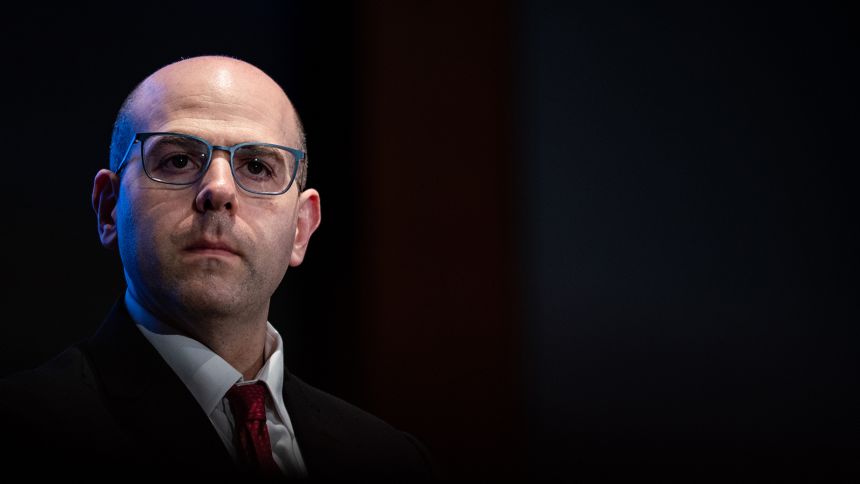Trump Nominates Economic Advisor Stephen Miran as Fed Governor to Fill Kugler’s Seat
Trump Nominates Economic Advisor Stephen Miran as Fed Governor to Fill Kugler’s Seat
By
Junia Wells
Last updated:
August 8, 2025
First Published:
August 8, 2025

Photo: CNN
Trump Taps Stephen Miran for Federal Reserve Board Role
President Donald Trump announced on Thursday his nomination of Stephen Miran, current chair of the Council of Economic Advisors, to serve as a Federal Reserve governor, filling the vacancy left by Adriana Kugler’s recent resignation. Miran is expected to hold the position only until January 31, 2026, completing Kugler’s unexpired term rather than stepping in as a long-term replacement or a potential Fed Chair candidate.
Temporary Appointment Amid Broader Fed Leadership Shuffle
Trump emphasized that the search for a permanent Fed governor will continue, with Miran acting as a caretaker. “He has been with me from the beginning of my Second Term, and his expertise in the world of economics is unparalleled,” Trump said. The nomination requires Senate confirmation, likely to occur after Congress reconvenes in September.
This move comes as Jerome Powell’s current term as Fed Chair is set to expire in May, with several candidates—including Governor Christopher Waller and former Governor Kevin Warsh—considered for the top role. Trump has hinted at the possibility of installing a “shadow chair” to provide an alternate voice on the board, potentially counterbalancing Powell’s decisions.
Miran’s Economic Views and Policy Stance
Stephen Miran has been a vocal critic of the Fed’s aggressive stimulus during the COVID-19 pandemic and has advocated for more unconventional economic measures. He is known as an architect of the “Mar-A-Lago Accord,” a controversial proposal to deliberately devalue the dollar to address America’s persistent current account deficit.
Miran also opposed Treasury Secretary Janet Yellen’s strategy to buy short-term Treasurys as a debt management tool. His views align with Trump’s push for sharply lower interest rates and a more growth-oriented monetary policy.
Industry and Market Perspectives on the Nomination
Marco Casiraghi, senior economist at Evercore ISI, described Miran’s appointment as a “stop-gap” measure, allowing Trump flexibility before making a more permanent Fed appointment. Miran’s role is expected to include voting on interest rates and financial regulation, but also potentially acting as a dissenting voice to Chair Powell’s policies.
At the recent Federal Open Market Committee meeting, Trump appointees Christopher Waller and Michelle Bowman both dissented from the decision to hold interest rates steady—a rare occurrence that signals growing division within the Fed.
Senate Reaction and Expectations
Senate Banking Committee Chairman Tim Scott praised Miran as “an accomplished economist” and acknowledged his contributions to pro-growth economic policies. Scott expressed hope that Miran would push for increased transparency and accountability at the Federal Reserve, ensuring the agency remains focused on its core mandates free from political influence.
Miran’s Background and Policy Experience
Before his current role, Miran was a senior advisor for economic policy during the first Trump administration, working closely with Treasury Secretary Steven Mnuchin. He played a pivotal role in designing the Paycheck Protection Program during the 2020 pandemic shutdown. Miran also brings experience from Wall Street as a senior strategist at Hudson Bay Capital Management and has been a senior fellow at the Manhattan Institute for Policy Research.
He has voiced support for reciprocal tariffs, reflecting Trump’s ongoing trade war policies, and is a strong advocate for cryptocurrency adoption.
What Lies Ahead for the Fed and Miran’s Role
If confirmed, Miran’s tenure will be closely watched as monetary policy debates intensify amid inflation concerns and economic uncertainties. His appointment may amplify White House influence on Fed decisions, especially if Trump’s calls for interest rate cuts grow louder.
Miran’s temporary term means the White House retains flexibility to shape the Fed’s future leadership, including the selection of a permanent chairperson who could steer the central bank through the next phase of economic challenges.
Popular articles
Subscribe to unlock premium content
Global Cultures and the Hidden Drivers of Productivity and Happiness

The Future of Personalized Medicine

Digital Nomads and the New Global Economy

Global Cultures and the Hidden Drivers of Productivity and Happiness

The Future of Personalized Medicine

Global Cultures and the Hidden Drivers of Productivity and Happiness









